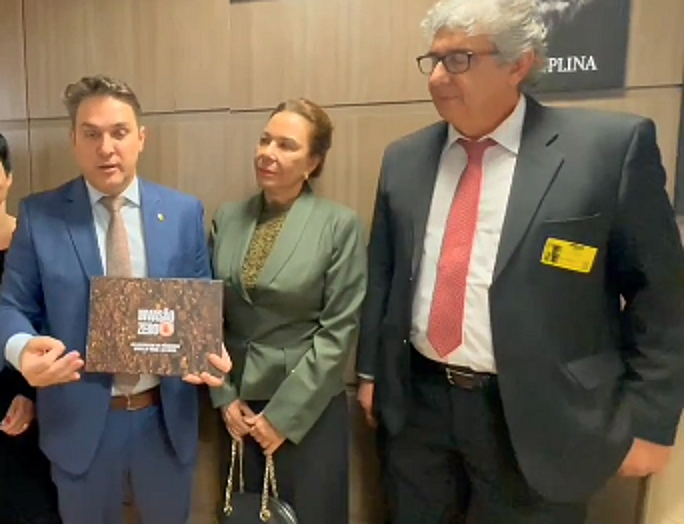The agribusiness group “Zero Invasion”, created by big landowners from the agro sector and known for dismantling land occupations without judicial backing from Bahia state, is under investigation by the Civil Police for involvement in the death of Maria de Fátima Muniz Pataxó, popularly known as Nega Pataxó.
The Indigenous leader was shot dead on Sunday (21) during what survivors of the attack described as a “hunt” against Indigenous individuals led by the Military Police and big farmers in a tactic similar to those used by armed rural militias, as frequently seen in the states of Mato Grosso do Sul and Rondônia.
According to Bahia Public Security Secretariat (SSP-BA, in Portuguese), the attack – which injured some Indigenous persons – was orchestrated by the “Zero Invasion”. Forensics proved that the shot that killed Nega Pataxó came from the gun of a farmer's 19-year-old son, arrested at the time of the attack. A reserve police officer who took part in the rural action was also arrested.
“Zero Invasion” has a National Registry of Legal Entities (called “CNPJ” in Brazil) and a statute. It has the support of business associations, the agribusiness and parliamentarians in the National Congress. To deal with the negative repercussions in the media after the killing of Nega Pataxó, the movement is advised by a team of experienced journalists in Brasília, who worked for the commercial media.
Investigated by the Civil Police for supposedly acting as a rural militia, “Invasion Zero” was funded in southern Bahia by rich and influential landowners. The group distributes leaflets to guide about the "protection of property" and claims not to act illegally, nor to condone violent acts.
The founders
One of the group’s founders, Luiz Uaquim, said to Brasil de Fato that “Zero Invasion” emerged in March 2023, aiming to curb the occupation of the Ouro Verde farm in Santa Luzia, Bahia state. Organized via WhatsApp groups, it gained 5,000 landowners and inspired similar groups in, at least, nine Brazilian states, besides the Parliamentary Front in the National Congress named after the agribusiness movement.
In April, Brasil de Fato informed that members of the “Zero Invasion” with Military Police officers, sieged families from the Landless Workers’ Movement (MST) in an area aimed at agrarian reform in Bahia. “We are going to remove the invaders with the Military Police,” said Uaquim in an audio released by local landowners. In the audio of the action against the MST in April 2023, Uaquim says: "The Jequié [a city in Bahia state] police battalion is being mobilized together with producers [landowners] to remove the invaders tomorrow morning. That’s what we are planning.”
After gaining notoriety for opposing Indigenous occupations during the Parliamentary Commission of Inquiry into the National Foundation for Indigenous Peoples (CPI da FUNAI, in Portuguese) in 2017, Uaquim ran for federal deputy (MDB Party) in 2018 but was not elected. In 2016, he ran for deputy mayor of the city of Ilhéus.
On the backstage, Brasil de Fato's sources in Bahia say that the movement is also coordinated by businesswoman Dida Souza, daughter of Osvaldo Souza, a Bahian politician who was a constituent deputy, with short periods in the former National Democratic Union Party (UDN), National Renewal Alliance Party (ARENA) and Liberal Front Party (PFL).
“Zero Invasion” became a Parliamentary Front
In the National Congress, politicians close to the agro sector were inspired by the name of the Bahian group and created the Zero Invasion Parliamentary Front, whose launch in October 2023 was attended by former president Jair Bolsonaro (Liberal Party).
Federal deputy Luciano Zucco (Republicans Party, Rio Grande do Sul state) leads the group, and federal deputy Pedro Lupion (Progressive Party, Paraná state) is responsible for institutional affairs. Former Bolsonaro minister Ricardo Salles, currently a federal deputy, is the group’s vice president.
Zucco, the coordinator of the MST Parliamentary Commission of Inquiry, which concluded in September without a final report, received in his office two of the group’s founders, businesswoman Dida Souza and Luiz Uaquim, who visited the politician in May last year.
Founder says “rural militia” is a narrative
Dinaman Tuxá, from the Articulation of Indigenous Peoples of Brazil (Apib, in Portuguese), called the group an “armed militia against Indigenous peoples’ agrarian reform.” The Indigenous organization demanded an investigation of the group and said the death of Nega Pataxó wasn’t an isolated case.
The Public Prosecutor's Office (MPF), the Federal Public Defender's Office (DPU) and the State Public Defender's Office of Bahia (DPE-BA) have declared that the murder of Indigenous people in southern Bahia is linked to a militia formed by military police officers operating in the state.
To Brasil de Fato, Luiz Uaquim said “Zero Invasion” is a “peaceful and law-abiding” movement. He also said that those responsible for killing Nega Pataxó aren’t members of the group. He added that the accusation of forming a rural militia is a "narrative" and that the conflicts were started by Indigenous peoples themselves. There are no records of farmers killed in conflicts, only Indigenous individuals.




